Serving 631 students in grades Prekindergarten-8, Webster Micro Society Magnet School ranks in the bottom 50% of all schools in Connecticut for overall test scores (math proficiency is bottom 50%, and reading proficiency is bottom 50%).
The percentage of students achieving proficiency in math is 24% (which is lower than the Connecticut state average of 40%). The percentage of students achieving proficiency in reading/language arts is 34% (which is lower than the Connecticut state average of 50%).
The student:teacher ratio of 15:1 is higher than the Connecticut state level of 12:1.
Minority enrollment is 85% of the student body (majority Black), which is higher than the Connecticut state average of 53% (majority Hispanic and Black).
Quick Stats (2025)
- School Type: Magnet School
- Grades: Prekindergarten-8
- Enrollment: 631 students
- Student:Teacher Ratio: 15:1
- Minority Enrollment: 85%
- Overall Testing Rank: Bottom 50% in CT
- Math Proficiency: 24% (Btm 50%)
- Reading Proficiency: 34% (Btm 50%)
- Science Proficiency: 35-39% (Btm 50%)
- Source: National Center for Education Statistics (NCES), CT Dept. of Education
Top Rankings
Webster Micro Society Magnet School ranks among the top 20% of public schools in Connecticut for:
Category
Attribute
Diversity
Percent Eligible For Free Lunch
School Overview
Webster Micro Society Magnet School's student population of 631 students has stayed relatively flat over five school years.
The teacher population of 43 teachers has grown by 7% over five school years.
School Type
Grades Offered
Grades Prekindergarten-8
(offers virtual instruction)
(offers virtual instruction)
Total Students
631 students
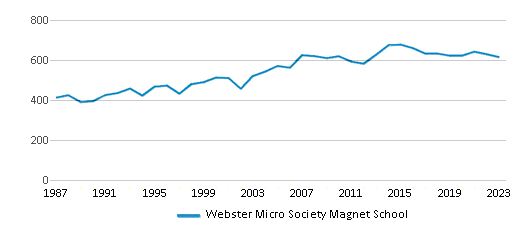
Gender %
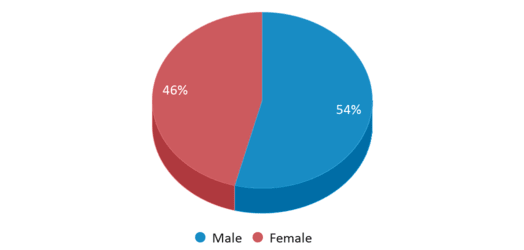
Total Classroom Teachers
43 teachers
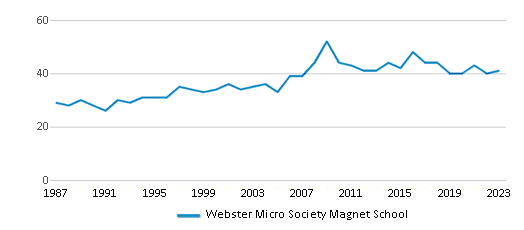
Students by Grade
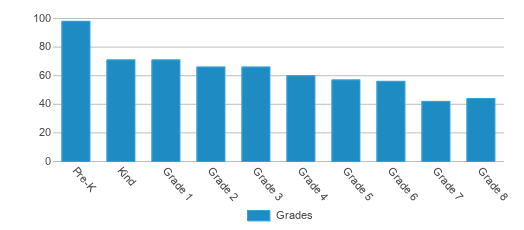
School Calendar
School Rankings
Webster Micro Society Magnet School ranks within the bottom 50% of all 942 schools in Connecticut (based off of combined math and reading proficiency testing data).
The diversity score of Webster Micro Society Magnet School is 0.70, which is more than the diversity score at state average of 0.68. The school's diversity has stayed relatively flat over five school years.
Overall Testing Rank
#707 out of 942 schools
(Bottom 50%)
(Bottom 50%)
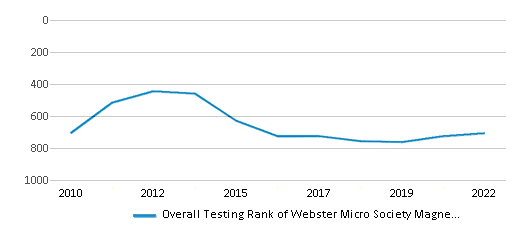
Math Test Scores (% Proficient)
24%
40%
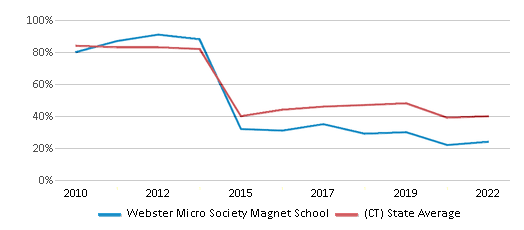
Reading/Language Arts Test Scores (% Proficient)
34%
50%
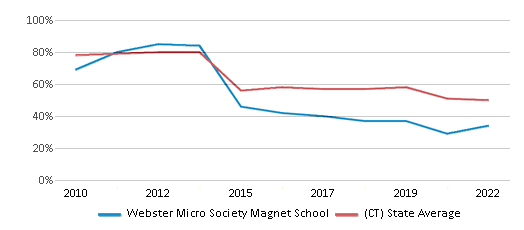
Science Test Scores (% Proficient)
35-39%
47%
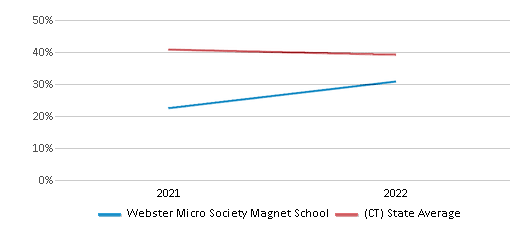
Student : Teacher Ratio
15:1
12:1
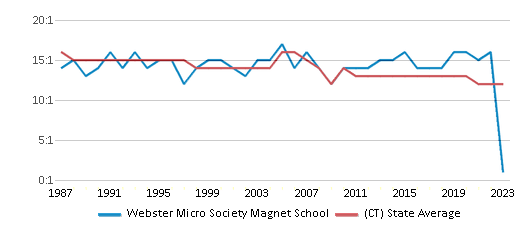
American Indian
n/a
n/a
Asian
6%
5%
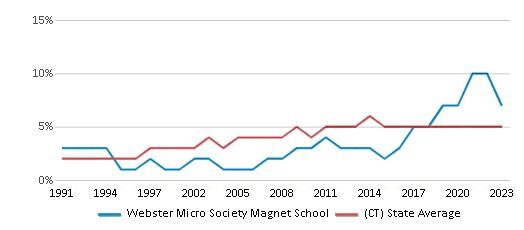
Hispanic
31%
31%
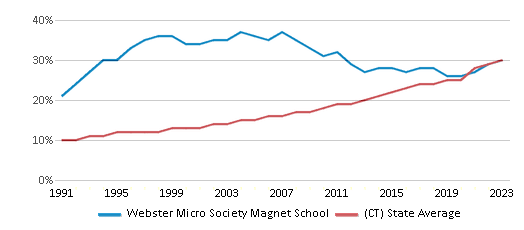
Black
42%
12%
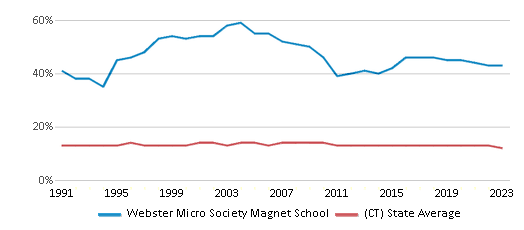
White
15%
47%
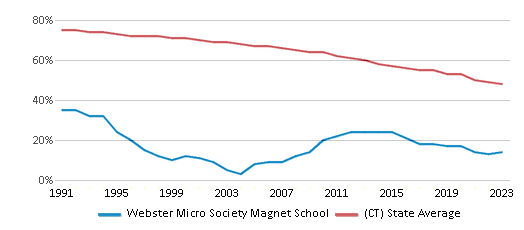
Hawaiian
n/a
n/a
Two or more races
6%
5%
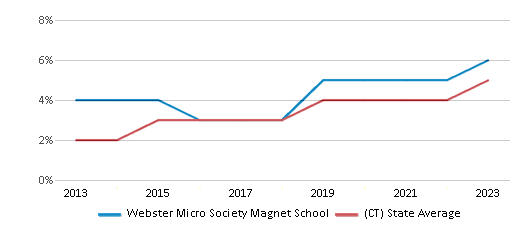
All Ethnic Groups
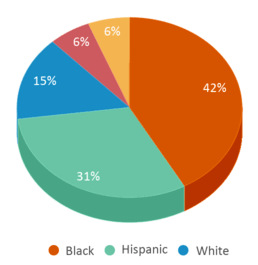
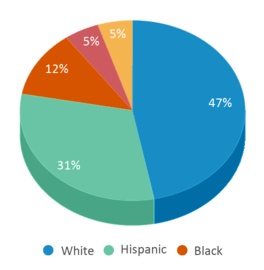
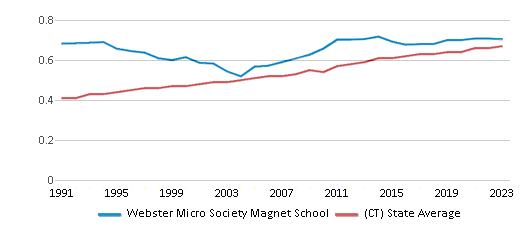
Eligible for Free Lunch
61%
37%
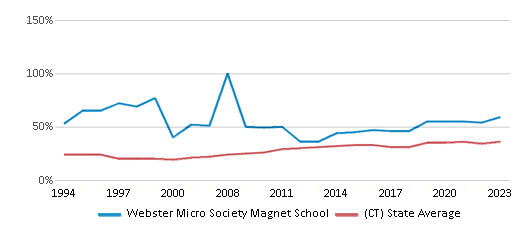
Eligible for Reduced Lunch
3%
6%
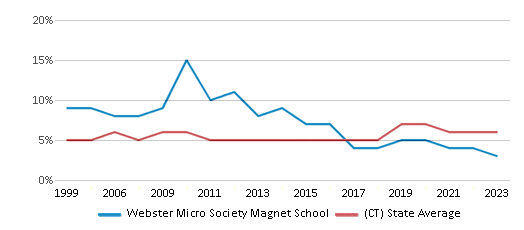
School Statewide Testing
School District Name
Source: National Center for Education Statistics (NCES), CT Dept. of Education
Profile last updated: 02/09/2025
Frequently Asked Questions
What is Webster Micro Society Magnet School's ranking?
Webster Micro Society Magnet School is ranked #707 out of 942 schools, which ranks it among the bottom 50% of public schools in Connecticut.
What percent of students have achieved state testing proficiency in math and reading?
24% of students have achieved math proficiency (compared to the 40% CT state average), while 34% of students have achieved reading proficiency (compared to the 50% CT state average).
How many students attend Webster Micro Society Magnet School?
631 students attend Webster Micro Society Magnet School.
What is the racial composition of the student body?
42% of Webster Micro Society Magnet School students are Black, 31% of students are Hispanic, 15% of students are White, 6% of students are Asian, and 6% of students are Two or more races.
What is the student:teacher ratio of Webster Micro Society Magnet School?
Webster Micro Society Magnet School has a student ration of 15:1, which is higher than the Connecticut state average of 12:1.
What grades does Webster Micro Society Magnet School offer ?
Webster Micro Society Magnet School offers enrollment in grades Prekindergarten-8 (offers virtual instruction).
What school district is Webster Micro Society Magnet School part of?
Webster Micro Society Magnet School is part of Hartford School District.
In what neighborhood is Webster Micro Society Magnet School located?
Webster Micro Society Magnet School is located in the West End neighborhood of Hartford, CT.
School Reviews
5 1/19/2016
My child began here last year in pre-k-3, and I was astounded at the level of involvement from para-professional classroom assistants right through to administration. Everyone at the school strives to create a personal relationship with the students, and take time assist, praise, and show children how to succeed. The ideas of "community" are always at the forefront, and my child loves attending school here.
5 10/17/2011
i use to go to this school ever since i was in first grade. i changed schools when i was going into 7th grade. i miss noah webster. i miss my teachers. the teacher i miss the most is mr.borawski. he was my best math teacher ever. i am now in 9th grade and i will never forget about my favoite school, Noah Webster Micro Society Magnet School
Review Webster Micro Society Magnet School. Reviews should be a few sentences in length. Please include any comments on:
- Quality of academic programs, teachers, and facilities
- Availability of music, art, sports and other extracurricular activities
Recent Articles

What Is A Charter School?
Explore the world of charter schools in this comprehensive guide. Learn about their history, how they operate, and the pros and cons of this educational innovation. Discover key facts about charter schools, including admission policies, demographics, and funding, as well as what to look for when considering a charter school for your child.

10 Reasons Why High School Sports Benefit Students
Discover the 10 compelling reasons why high school sports are beneficial for students. This comprehensive article explores how athletics enhance academic performance, foster personal growth, and develop crucial life skills. From improved fitness and time management to leadership development and community representation, learn why participating in high school sports can be a game-changer for students' overall success and well-being.

February 05, 2025
Understanding the U.S. Department of Education: Structure, Impact, and EvolutionWe explore how the Department of Education shapes American education, from its cabinet-level leadership to its impact on millions of students, written for general audiences seeking clarity on this vital institution.







